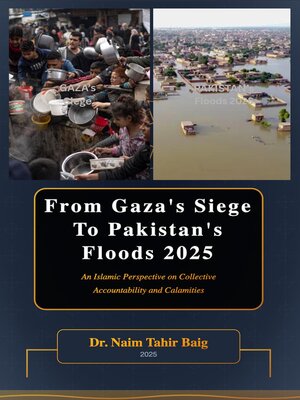From Gaza's Siege to Pakistan's Floods 2025
ebook ∣ An Islamic Perspective on Collective Accountability and Calamities
By Dr Naim Tahir Baig

Sign up to save your library
With an OverDrive account, you can save your favorite libraries for at-a-glance information about availability. Find out more about OverDrive accounts.
Find this title in Libby, the library reading app by OverDrive.



Search for a digital library with this title
Title found at these libraries:
| Library Name | Distance |
|---|---|
| Loading... |
Book Description
From Gaza's Siege to Pakistan's Floods 2025: An Islamic Perspective on Collective Accountability and Calamities
In an era marked by unprecedented global crises, from the devastating siege of Gaza to the catastrophic floods that have claimed over 750 lives across Pakistan in 2025, this innovative work explores the profound theological and philosophical questions that arise when natural disasters intersect with human suffering. Drawing on the latest research showing over 70,000 deaths in Gaza and the intense monsoon floods affecting millions in Pakistan, Dr. Naim Tahir Baig presents a comprehensive Islamic framework for understanding collective responsibility in times of crisis.
This scholarly yet accessible examination delves deep into Quranic perspectives on divine will, exploring how classical Islamic teachings on fitnah (trials) and museebah (misfortunes) provide guidance for contemporary believers facing global calamities. The work skillfully balances traditional theological interpretations with modern scientific understanding, addressing the complex relationship between climate change, human agency, and divine providence. Through careful analysis of key Quranic verses and authenticated hadiths, the author illuminates how disasters serve not merely as punishments, but as multifaceted divine reminders calling for collective reflection, repentance, and action.
The book's unique contribution lies in its integration of historical precedents from Islamic civilization—from Ottoman responses to earthquakes and famines to contemporary Muslim scholarly discourse—with urgent contemporary crises. The author examines how recent peer-reviewed research revealing significant underreporting of casualties in Gaza (with traumatic injury deaths estimated at 64,260 between October 2023 and June 2024) parallels the theological concept of collective accountability found in verses such as Surah Al-Anfal 8:25, which warns of trials that affect entire communities when injustice remains unaddressed.
Beyond theological analysis, this work offers practical pathways forward, emphasizing how Islamic principles of environmental stewardship, social justice, and international solidarity can guide Muslim communities toward meaningful response rather than passive fatalism. The book serves as both a scholarly resource for academics studying Islamic theology and contemporary global issues, and a spiritual guide for believers seeking to understand their role in addressing collective crises. With comprehensive appendices featuring original Arabic texts, current statistical data, and extensive bibliographies, this work stands as an essential contribution to Islamic environmental ethics and contemporary Muslim thought.







